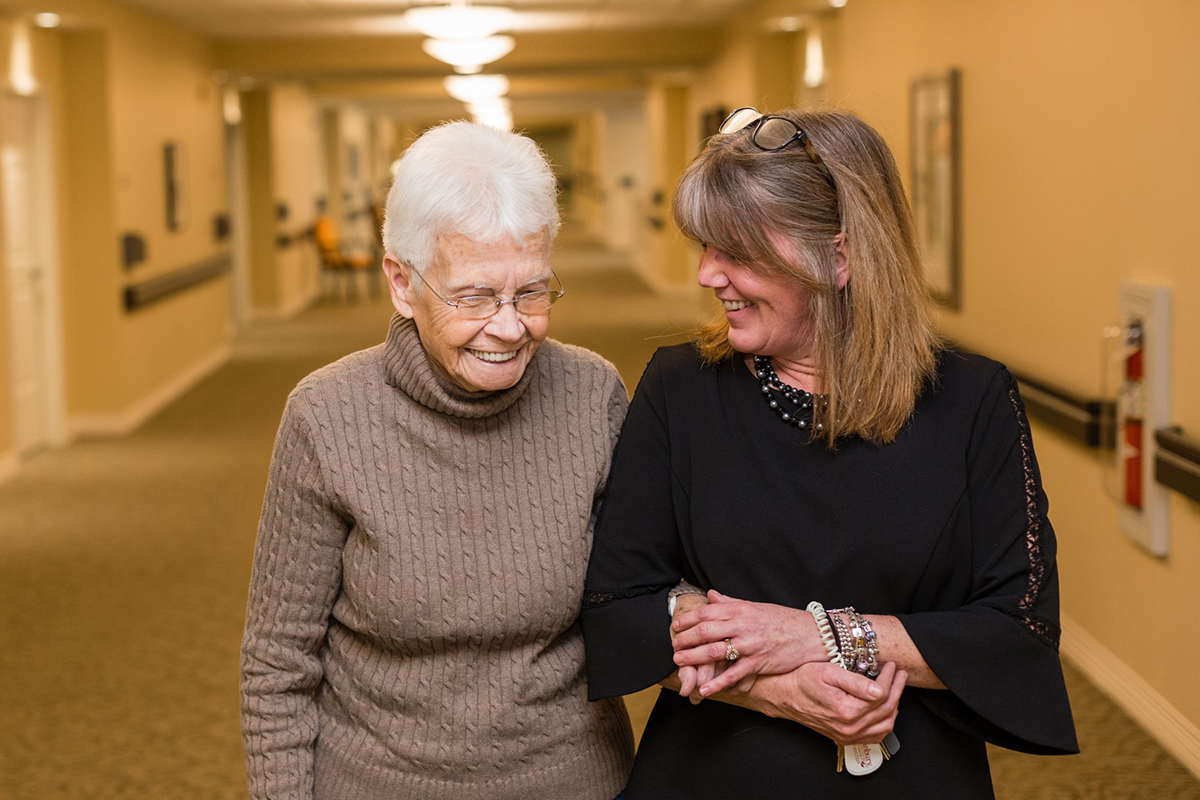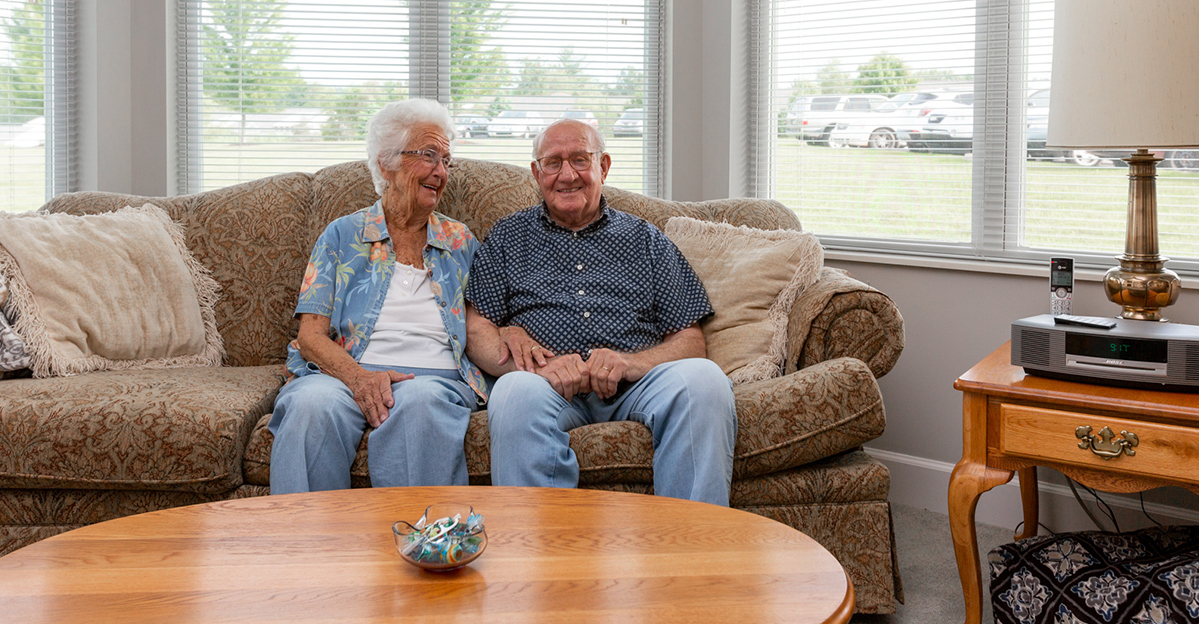Parkinson’s and Alzheimer’s are neurodegenerative diseases that affect how the brain functions. Both diseases are progressive, meaning their symptoms tend to worsen over time. This can make it challenging for individuals to manage daily tasks safely.
While both Parkinson’s and Alzheimer’s impact the brain, they do so in different ways. In this comprehensive guide, we’ll share everything you need to know about Parkinson’s vs Alzheimer’s, including care approaches and treatment options, to help you better understand the differences and how to support someone living with these conditions.
What Is Parkinson’s Disease?
Parkinson’s Disease is a progressive condition that affects the brain’s ability to control movement. As the disease progresses, individuals may experience symptoms like tremors (shaking), stiffness, slow movement, and difficulty with balance. These changes can make everyday tasks, like walking or getting dressed, more challenging.
What Is Alzheimer’s Disease?
Alzheimer’s is a type of dementia that affects memory, thinking, and behavior. In the early stages of Alzheimer’s, a person may experience forgetfulness, confusion, and difficulty with simple tasks. As the disease progresses, these symptoms worsen, making it harder for the person to recognize loved ones, communicate, or care for themselves.
Similarities Between Parkinson’s and Alzheimer’s
While each disease is unique, there are some important similarities between Alzheimer’s vs Parkinson’s. Understanding these similarities can help you better support someone living with these conditions.
- Progressive Symptoms: Both Parkinson’s and Alzheimer’s are progressive diseases. This means the symptoms worsen over time, making it more challenging for individuals to manage daily activities. In the early stages, persons may experience mild forgetfulness or difficulty performing daily tasks independently. But as the disease progresses, these symptoms can become more severe, affecting their ability to move, communicate, and care for themselves.
- Cognitive Decline: Another key similarity is that both diseases can cause cognitive decline. In Alzheimer’s, this often begins with memory loss and confusion, while in Parkinson’s, it can lead to problems with thinking, decision-making, and concentration as the disease progresses.
- Behavioral Changes: Both conditions can also affect a person’s behavior. Individuals may become more irritable, depressed, or anxious, which can be difficult not only for them, but also for their family members who are supporting them.
- Physical Impact: As the diseases progress, people with Parkinson’s may experience tremors, stiffness, and difficulty with movement, while those with Alzheimer’s may also become less mobile as their cognitive functions decline. In both cases, assistance with activities of daily living such as dressing, eating, or bathing, may be necessary.
- Emotional Impact: Finally, both conditions can affect emotional well-being, leading to feelings of frustration, fear, and confusion for the person living with the disease.

Differences Between Parkinson’s and Alzheimer’s
When comparing Parkinson’s vs Alzheimer’s, it can be helpful to understand how each disease affects the brain. While both conditions are progressive and can significantly impact a person’s ability to perform everyday tasks, there are some key differences worth noting, including:
- Main Areas of Impact: Parkinson’s primarily affects the motor system, which controls movement, balance, and coordination. In contrast, Alzheimer’s mainly impacts cognitive functions, including memory, thinking, and decision-making. It’s caused by the buildup of specific proteins (amyloid plaques and tau tangles), which disrupt brain cell communication.
- Physical Symptoms: In Parkinson’s, physical symptoms are often noticeable early on, including tremors (shaking), muscle stiffness, slowed movements, and issues with posture and balance. As the disease progresses, individuals may find it harder to walk or complete everyday tasks like dressing or eating. In contrast, Alzheimer’s typically starts with fewer physical symptoms. Over time, though, those affected may experience physical challenges, such as difficulty walking, swallowing, or controlling their muscles.
- Cognitive Symptoms: While both conditions are associated with cognitive decline, it manifests differently in each. With Parkinson’s, cognitive symptoms develop more slowly and may include memory problems, trouble focusing, and changes in mood or personality. In some cases, Parkinson’s can lead to Parkinson’s dementia, a condition that affects thinking and memory. Alzheimer’s, however, primarily affects memory, especially short-term memory, and gradually worsens as the disease progresses. People with Alzheimer’s may have difficulty recalling familiar names, places, and events, which can make daily life more challenging.
- Cause: The underlying causes of Parkinson’s and Alzheimer’s are different as well. Parkinson’s is caused by the death of dopamine-producing cells in the brain, which disrupts movement control. This leads to the motor symptoms associated with the disease. Alzheimer’s, on the other hand, is characterized by the accumulation of abnormal protein deposits in the brain, which are known as amyloid plaques and tau tangles. These disrupt communication between brain cells and eventually lead to cell death, which causes the cognitive decline that defines the disease.
- Progression: Parkinson’s often starts with motor symptoms, like tremors or stiffness. As the disease progresses, cognitive changes may also develop. In the later stages, individuals may struggle with speech, thinking, and managing emotions. On the other hand, Alzheimer’s typically begins with memory loss and confusion. As the disease advances, it can lead to challenges with language, decision-making, and mobility.
Diagnosis: How Are Parkinson’s and Alzheimer’s Detected?
Diagnosing either Parkinson’s or Alzheimer’s involves a thorough medical evaluation, as both conditions may share similar symptoms with other health issues. For Parkinson’s, doctors usually begin with a physical exam and a review of medical history. They may perform tests to assess motor skills, such as walking, balance, and coordination. In some cases, brain imaging scans may be used to rule out other conditions.
An Alzheimer’s diagnosis typically starts with a detailed medical history review and cognitive tests that evaluate memory, problem-solving, and language skills. Brain imaging, such as CT or MRI scans, can help doctors identify changes in the brain that are characteristic of the disease. While there’s no single test to diagnose either condition, early diagnosis can make a big difference in getting the right support and managing symptoms more effectively.
Parkinson’s vs Alzheimer’s: Treatment Approaches
When it comes to treating Parkinson’s vs Alzheimer’s, the approaches for each condition differ based on how they affect the brain. For Parkinson’s, treatment typically focuses on managing symptoms, particularly motor control, through medications that help replenish dopamine in the brain. Other treatments, such as physical therapy, can help improve movement and balance.
On the other hand, Alzheimer’s treatment aims to slow the progression of cognitive decline. Medication may be used to help manage memory and thinking problems by regulating neurotransmitters in the brain. While there is no cure for either condition, these treatments can significantly improve the quality of life for those affected.

Parkinson’s and Alzheimer’s Impact on Daily Life
Both Parkinson’s and Alzheimer’s can present significant challenges that may affect daily life, especially during later stages. For those with Parkinson’s, physical symptoms like tremors, stiffness, and difficulty with movement can make performing activities of daily living (ADLs), such as dressing, eating, or walking, challenging. As Parkinson’s progresses, individuals may require more assistance with mobility and coordination.
In contrast, Alzheimer’s primarily impacts cognitive functions, including memory, thinking, and communication. People with Alzheimer’s may struggle to remember important details, follow conversations, or complete familiar tasks.
Care Approaches for Parkinson’s and Alzheimer’s
For Parkinson’s, the focus is on managing physical symptoms. A combination of medication and physical therapy can help control these symptoms. Gentle exercises, like stretching or regular walks, can improve balance and mobility. It’s also important to make the home safe by installing grab bars and removing any trip hazards to reduce the risk of falls.
When it comes to Alzheimer’s, the main goal is to support cognitive changes, like memory loss and confusion. Breaking tasks into smaller steps and offering choices can help your loved one feel more in control without becoming overwhelmed. As with Parkinson’s, safety is a top priority. Removing potential trip hazards and labeling commonly used items can help your loved one navigate their home safely.
If caring for your family member at home starts to feel overwhelming, it may be time to explore additional support. Memory care communities have trained caregivers and specialized programs designed to help seniors with Parkinson’s and Alzheimer’s.
Choosing the Right Senior Living Community
If a loved one is living with Parkinson’s or Alzheimer’s, finding the right community can make a significant difference in their quality of life. Here are a few key factors to keep in mind:
- Care Needs: For Parkinson’s, physical therapy and medication management are often necessary, while Alzheimer’s care focuses more on cognitive support, such as memory aids and structured routines. When looking for a community for a loved one, it’s important to find one that offers services tailored to their specific needs.
- Safety and Environment: A safe and supportive environment can help prevent wandering and reduce the risk of falls for those with Parkinson’s or Alzheimer’s.
- Employees and Support: The quality of caregivers can greatly impact your loved one’s experience. When choosing a community, ensure employees have the necessary training required to meet your loved one’s unique needs.
- Social Engagement: Social connections can play a crucial role in the well-being of individuals with Parkinson’s or Alzheimer’s. It can be helpful to prioritize communities that offer engaging activities and programs designed to keep residents socially connected.
- Family Involvement: It’s important for families to stay involved in the care process. Ask about visiting hours, family meetings and events, and how the community keeps families informed about their loved one’s progress.
- Visit and Trust Your Instincts: Finally, take the time to visit the community in person. Observe how the employees interact with residents and see if the environment feels welcoming and supportive

Frequently Asked Questions
Understanding the differences and similarities between Parkinson’s and Alzheimer’s can be overwhelming, especially when trying to navigate care options for a loved one. Here are some helpful answers to some of the most common questions:
What’s the Difference Between Alzheimer’s and Parkinson’s?
Parkinson’s vs Alzheimer’s can be confusing, as both are neurodegenerative diseases that affect the brain. Parkinson’s primarily impacts movement and causes symptoms like tremors and stiffness. Alzheimer’s, on the other hand, affects memory and cognitive function, often leading to confusion and difficulty with everyday tasks. While both diseases are progressive, they impact different areas of the brain and have different symptoms.
Are Parkinson’s and Alzheimer’s Genetic?
It’s important to note that both Parkinson’s and Alzheimer’s can have genetic factors, but not everyone with a family history of these conditions will develop them. Certain genes may increase the risk of Alzheimer’s, while only a small percentage of cases are inherited. Lifestyle and environmental factors can also play a role in both diseases.
What Are the Early Signs of Parkinson’s vs Alzheimer’s?
Early signs of Parkinson’s disease often include tremors, slow movements, and changes in posture or walking. In contrast, Alzheimer’s usually begins with memory loss, confusion, and difficulty finding words.
Is Parkinson’s a Form of Dementia?
Parkinson’s itself is not classified as a form of dementia, but some individuals with Parkinson’s may experience cognitive decline that leads to dementia. This is known as Parkinson’s disease dementia and can affect memory, thinking, and reasoning. It is different from Alzheimer’s but can share some similar symptoms.
Can Someone Have Parkinson’s and Alzheimer’s at the Same Time?
While it’s possible for someone to have both Alzheimer’s disease and Parkinson’s disease, this is not common.
Will Parkinson’s Turn into Alzheimer’s?
It’s completely natural to worry when a loved one is diagnosed with Parkinson’s disease. While both Parkinson’s and Alzheimer’s are progressive brain conditions, they are different from each other, and one does not turn into the other. However, some people with Parkinson’s may experience memory problems or confusion, which can be similar to Alzheimer’s symptoms. This doesn’t mean they are developing Alzheimer’s disease.
If you notice changes in your parent’s memory or behavior, it’s a good idea to talk to their doctor. They can help you understand what’s happening and guide you in finding ways to manage your loved one’s symptoms.
How Can I Support a Loved One With Parkinson’s or Alzheimer’s?
You can support someone with Parkinson’s or Alzheimer’s by creating a safe, comfortable environment and offering help with daily tasks. Working with health care professionals and finding a supportive community that understands their needs can also help improve your loved one’s quality of life.
StoryPoint Group: We’re Here for You and Your Loved One
At StoryPoint Group communities, we understand the challenges you face in providing the best support for your loved one. That’s why we’re here to offer you all the support you need. If you have questions about memory care or any other type of senior living, we’re here to help you. Give us a call today at 1-844-275-9990 or tour a StoryPoint Group community near you.











